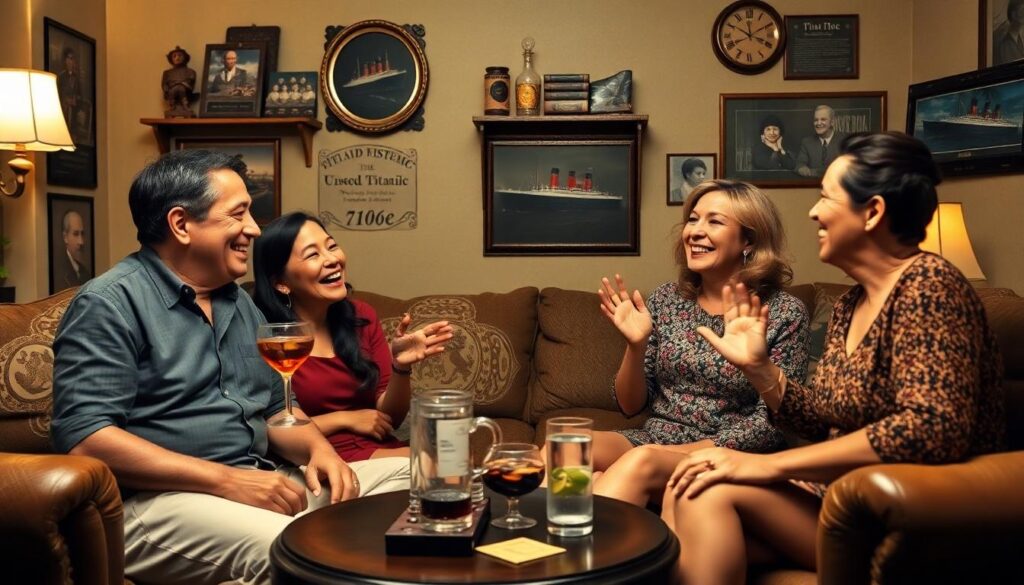Looking for a laugh that won’t sink your day? We’ve gathered the best Titanic jokes that are guaranteed to break the ice at any social gathering. From puns that make waves to one-liners that’ll have everyone floating with laughter, our collection ranges from the classically corny to the surprisingly clever.
While the Titanic disaster was undoubtedly tragic, humor has long been humanity’s way of processing difficult events throughout history. We believe there’s room for tasteful comedy that acknowledges the past while bringing smiles to the present. That’s why we’ve curated these jokes with both humor and respect in mind—ensuring you’ll find something that tickles your funny bone without crossing the line.
10 Iceberg-Breaking Titanic Jokes That Will Make You Laugh and Cringe
- What did the Titanic say when it hit the iceberg? “Ice to meet you!” This classic play on words never fails to break the ice at parties, just like the iceberg broke the ship’s hull.
- Why don’t they serve ice on the Titanic II? Because they’re terrible at avoiding the extras! Some jokes sink faster than others, but this one manages to stay afloat in comedy circles.
- The captain of the Titanic walks into a bar. The bartender asks, “What’ll it be?” The captain replies, “Anything but on the rocks.” Timing is everything with this joke, much like navigation was for the actual vessel.
- How many Titanic survivors does it take to change a lightbulb? More than you’d think – they weren’t very good at finding lifeboats in the dark. Dark humor indeed, but sometimes we need a little edge to our comedy.
- What’s the most popular cocktail on the Titanic? An iceberg straight up with a twist. Mixologists might cringe, but history buffs will appreciate the clever reference.
- When the Titanic first set sail, the captain shouted, “Full steam ahead!” After hitting the iceberg, he shouted, “Full swim ahead!” Word play transforms this tragic moment into an unexpected punchline.
- Why couldn’t they play cards on the Titanic? Because the deck was stacked against them. This double entendre works on multiple levels for both card players and maritime enthusiasts.
- A passenger asked the captain of the Titanic, “Why is there so much ice in my drink?” The captain replied, “We found a big chunk of it up ahead.” Foreshadowing has never been so humorously inappropriate.
- What’s the fastest way to get off the Titanic? Take the next available iceberg. Sometimes efficiency comes with a cold price tag, as this joke reminds us.
- The Titanic pool is still filled with the same water. That’s commitment to historical preservation! This deadpan one-liner delivers its punchline with the subtle impact of an unexpected collision.
The Unsinkable Humor: Why Titanic Jokes Have Endured for Decades
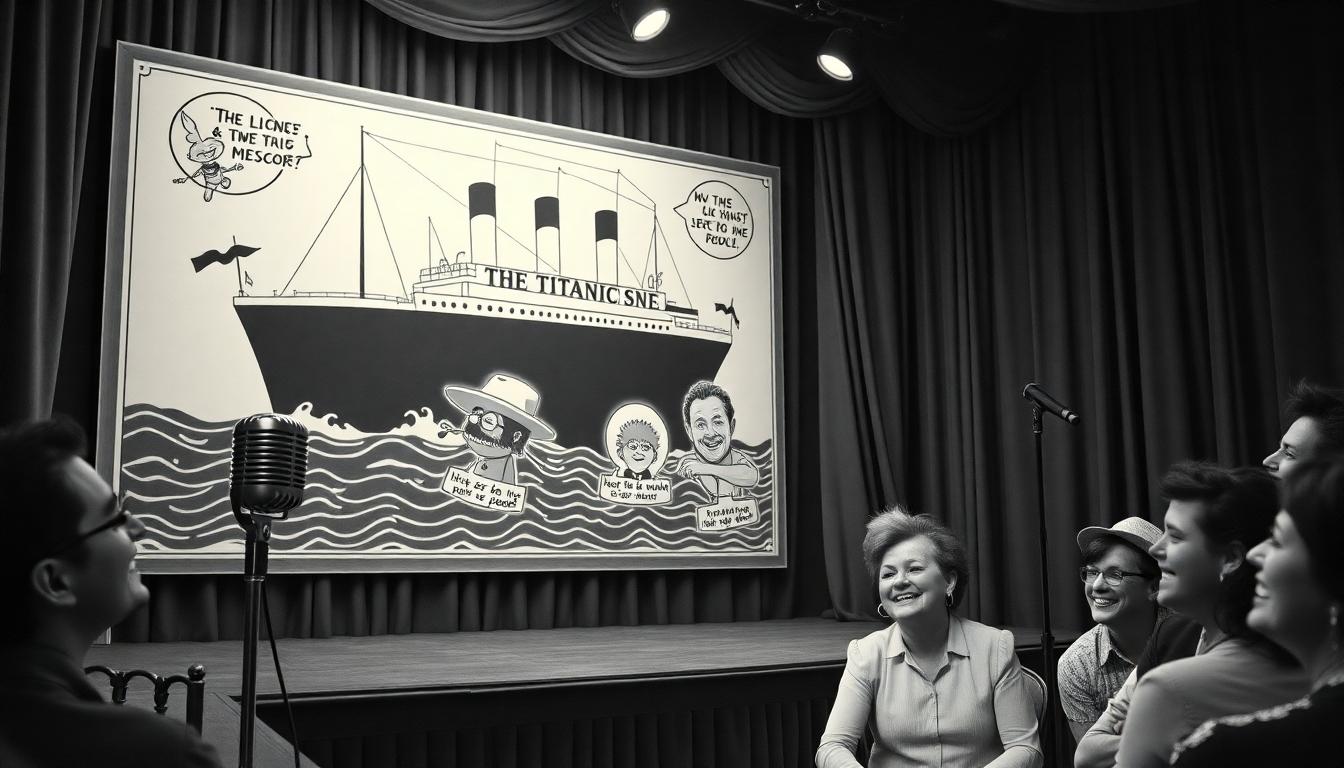
The Immediate Aftermath
Titanic jokes emerged almost immediately after the 1912 disaster, contrary to the belief that pre-television societies lacked humor about distant tragedies. Czech humorist Jaroslav Hašek was among the first to document comedic takes on the tragedy, while publications like Humoristické listy also featured early humorous content about the event. This swift comedic response demonstrates humanity’s natural tendency to process tragedy through humor, establishing a pattern that continues to this day.
Cultural Symbolism
The Titanic’s story represents a perfect storm of satirical elements that keep jokes afloat even after a century. Often portrayed as a “microcosm of Western civilization,” the ship’s tale embodies themes of hubris, class division, and human vulnerability that resonate across generations. The irony of the “unsinkable” designation colliding with reality creates a natural punchline that comedians and casual jokesters continue to leverage. Many jokes target the overconfidence in technology or highlight the stark social hierarchies that determined survival odds aboard the ship.
Evolution of Titanic Humor
Modern Titanic jokes typically fall into recognizable categories that blend historical knowledge with clever wordplay. Popular examples include puns like “What’s the Titanic’s favorite song? Nearer My God to Thee” and absurd scenarios such as “Why didn’t the Titanic see the iceberg? It didn’t have its glaciers on.” These jokes rely on audience familiarity with the disaster’s key components—the orchestra’s final performance, the “unsinkable” claim, and the iceberg collision—transforming tragedy into accessible comedy that can be shared across cultural boundaries.
Psychological Benefits
Humor about the Titanic serves as a collective coping mechanism that helps transform trauma into something more manageable. By focusing on the ironies of the disaster—such as the contrast between the ship’s opulence and its fate—these jokes allow people to confront mortality and human fallibility through the safer lens of comedy. The emotional distance created by time permits jokes that would have been inappropriate in the immediate aftermath, creating a unique space where laughter and remembrance coexist.
Enduring Appeal
The persistence of Titanic jokes highlights the disaster’s permanent place in our cultural consciousness. Even though occurring over a century ago, the Titanic continues to represent a perfect blend of historical significance and narrative power that makes it ripe for humorous interpretation. The jokes simultaneously memorialize the event while making it accessible to new generations, ensuring that even as the physical wreckage deteriorates on the ocean floor, the story remains buoyant in our collective memory through both serious historical accounts and lighthearted humor.
Classic Titanic One-Liners That Never Get Old
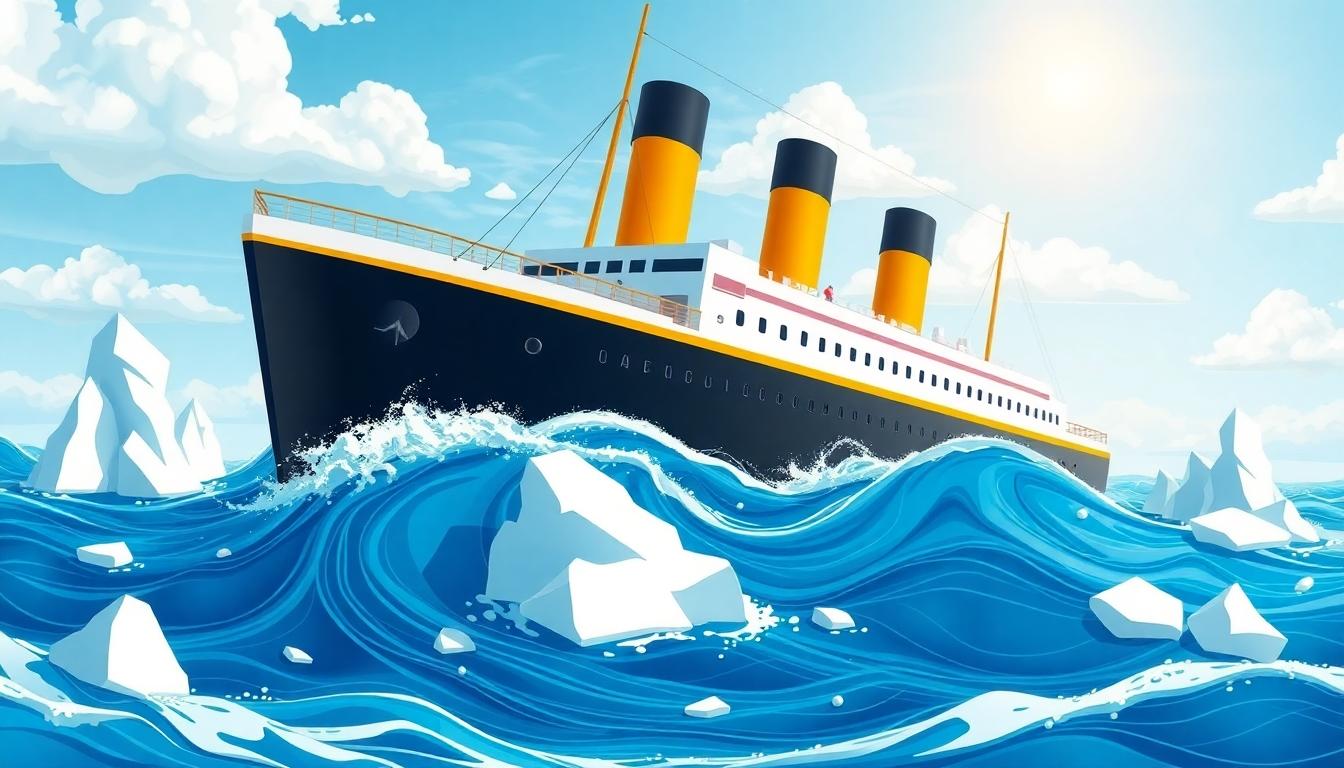
We’ve collected some of the most timeless Titanic jokes that continue to make waves in comedy circles. These quick-witted one-liners prove that humor can float even in the choppiest waters of history.
- Why did the Titanic always bring a pencil? To draw the iceberg’s attention!
- What did the iceberg say to the Titanic? “You’re looking a little ship-shape!”
- Why did the Titanic never get lost? It always followed the current!
- What’s a Titanic fan’s favorite game? Iceberg ahead, dodgeball!
- Why don’t they play cards on the Titanic? Because the captain was always standing on the deck!
Captain’s Favorites
The captain’s humor stands at the helm of these nautical jokes, steering us toward laughter with these maritime quips. Ship commanders apparently had quite the sense of humor, as evidenced by these captain-centered one-liners.
- What did the captain say when the Titanic was on a roll? “Let’s cruise into history!”
- What do you call a Titanic expert? A ship-shape scholar!
- Why was the Titanic always calm? It knew how to keep its cool under pressure!
Iceberg Ahead Punchlines
These icy punchlines focus on the infamous obstacle that sealed the Titanic’s fate. Cold humor at its finest, these jokes break the ice at any gathering with their clever wordplay and unexpected twists.
- What did the Titanic captain say when he saw a pile of cereal in the ocean? Oh no, we’re going to hit an Ice-berg!
- What kind of lettuce was served on the Titanic? Iceberg.
- What do you get when you cross the Titanic with the Atlantic Ocean? About halfway.
-
Girl: Our relationship is like the Titanic.
Boy: What does that mean?
Titanic Jokes That Push the Boundaries of Dark Humor

Titanic jokes venture into the area of dark humor, using irony and unexpected twists to transform tragedy into comedy. These jokes typically play with the stark contrast between the ship’s “unsinkable” reputation and its ultimate fate, creating humor from historical tragedy.
Too Soon? The Timeline of Acceptability
Contrary to popular belief, disaster jokes including those about the Titanic have existed since the early 20th century, not just in modern times. Historical research indicates these jokes emerged almost immediately following the disaster, long before television popularized such humor. The question of “too soon” becomes interesting when we consider that comedic responses to the Titanic tragedy have been circulating for over a century now. Cultural context and media coverage significantly influence when society deems these jokes acceptable, with some communities embracing them sooner than others. Evidence shows that disaster humor predated televised coverage, challenging the assumption that mass media created this form of comedy.
Handling Sensitive Topics with Comedy
Dark humor serves as a powerful coping mechanism that helps people process traumatic events collectively. Comedy addressing the Titanic disaster allows individuals to confront mortality and human vulnerability through the safety of laughter. These jokes often symbolically address the failure of modernity and humanity’s hubris in claiming to have built an “unsinkable” ship. The widespread popularity of Titanic jokes, appearing in over 200 comedy collections, demonstrates their effectiveness in creating shared experiences around historical tragedy. Puns and wordplay feature prominently in these jokes, transforming grim circumstances into accessible humor that crosses cultural boundaries. We find that this type of comedy creates a unique space where people can simultaneously acknowledge the tragic nature of the event while finding momentary relief through humor.
Modern Titanic Jokes That Have Gone Viral
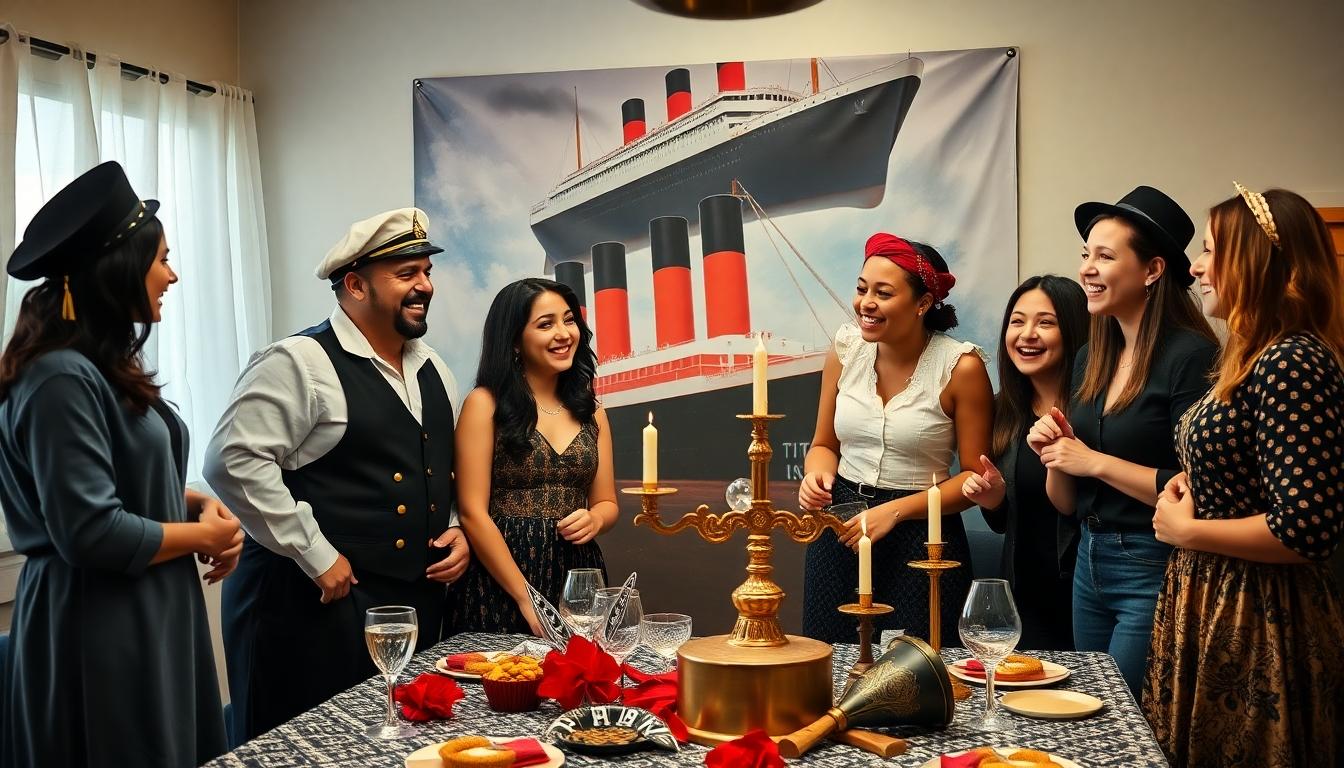
In today’s digital industry, historical tragedies often become unexpected sources of viral humor. Titanic jokes have found new life online, where creative content creators transform the infamous maritime disaster into shareable comedy that resonates with modern audiences.
Social Media’s Favorite Titanic Memes
Social media platforms have become breeding grounds for Titanic-themed humor that ranges from clever to darkly comedic. Instagram skits frequently feature unexpected twists on the disaster, presenting characters with hilariously twisted priorities during the ship’s sinking moments. These dark humor portrayals have garnered thousands of shares, with viewers appreciating the absurdist take on historical tragedy. Popular memes often juxtapose serious historical imagery with contemporary references, creating a comedic contrast that feels both irreverent and strangely relatable.
One-liners and puns dominate many Titanic joke collections across platforms, with websites like Punsify offering extensive compilations. Fan favorites include clever wordplay such as “The Titanic had a great sense of humor; it always knew how to make waves” and the school-friendly “Why did the Titanic always carry a pencil? In case it needed to draw the line!” These jokes transform the disaster into accessible humor through simple wordplay that appeals to broad audiences.
TikTok’s Take on the Tragic Voyage
TikTok has emerged as the premier platform for reimagining Titanic scenarios with a distinctly modern sensibility. Creative users produce short-form videos that parody survival scenarios, often highlighting generational differences in how people might have responded to the disaster. These clips typically feature creators acting out absurd “what if” situations that place contemporary attitudes and technology aboard the doomed vessel.
Dad jokes about the Titanic have found particular success on TikTok, with videos showcasing groan-worthy puns garnering millions of views. The platform’s algorithm has amplified these lighthearted takes, creating viral trends centered around Titanic icebreaker jokes and survival parodies. Funny footage often reimagines the ship’s pivotal moments with unexpected twists, emphasizing comedic elements over the tragedy’s solemnity. TikTok’s format perfectly suits these brief comedic interpretations, allowing creators to deliver punchlines quickly while capitalizing on the platform’s preference for content that surprises and entertains in equal measure.
Titanic Movie Inspired Jokes That Rose to the Occasion
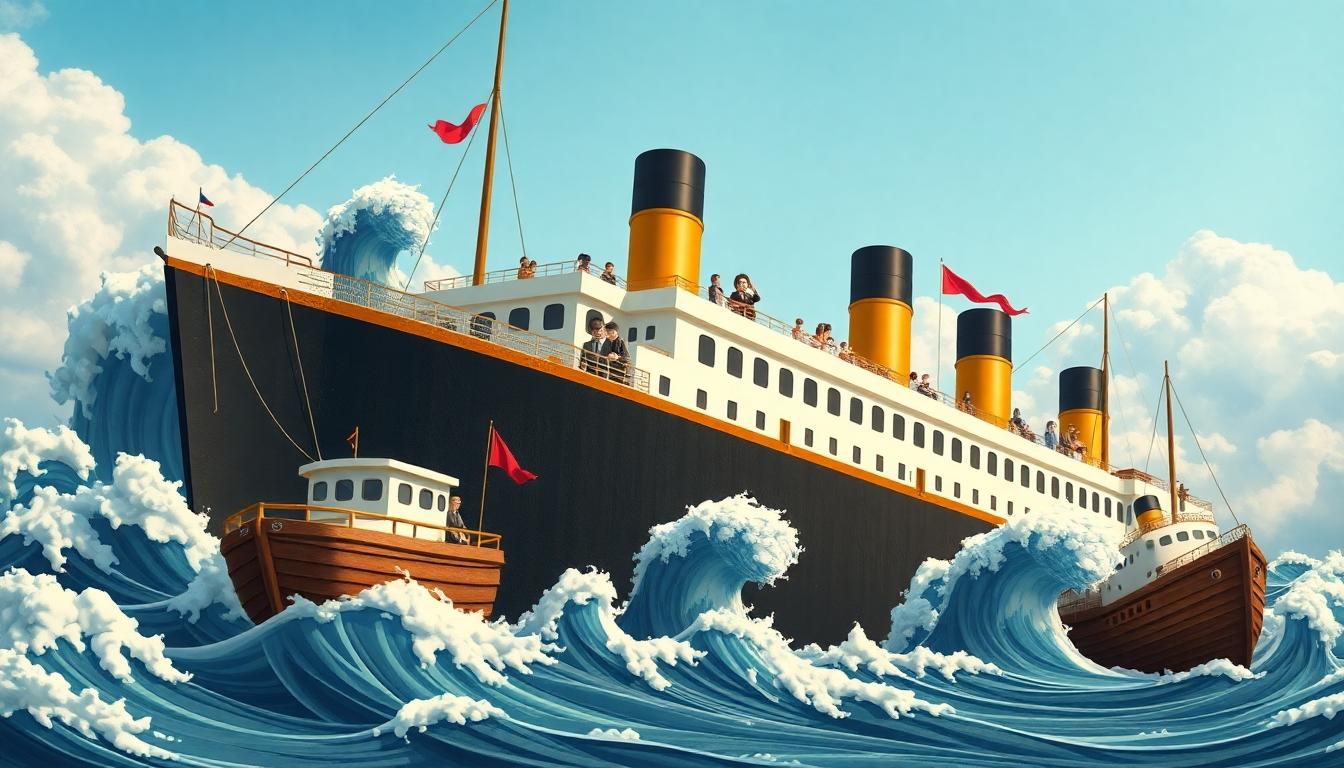
James Cameron’s blockbuster film has sparked countless comedic takes since its 1997 release. From parodies to puns, the movie continues to inspire humor that keeps audiences laughing decades after its debut.
Jack and Rose Quips
Jack and Rose’s ill-fated romance provides endless material for witty jokes and humorous observations. Their love story amidst disaster, coupled with the stark class differences between them, makes for particularly rich comedic territory. Many jokes play on the tragic irony of their relationship that bloomed during humanity’s most infamous maritime catastrophe. Popular quips often reference their brief but intense connection, with humorous takes on everything from the steamy car scene to their final moments together in the freezing Atlantic waters.
“My Heart Will Go On” Parodies
Celine Dion’s iconic theme song has become almost as famous as the movie itself—and equally ripe for parody. A particularly popular comedic take involves transforming the emotional ballad into “My Fart Will Go On,” complete with strategically placed flatulence sound effects that replace key musical moments. This irreverent approach has generated widespread amusement across various platforms. Notable parodies also include creative versions from sketch comedy shows and internet creators who’ve reimagined the song with alternative lyrics referencing other aspects of the film’s plot or modern pop culture references.
Beyond musical parodies, the Titanic franchise has inspired more elaborate comedic productions. The 1998 MTV Movie Awards featured Ben Stiller and Vince Vaughn pitching “Titanic: The Sequel” directly to James Cameron, humorously suggesting that the drowning victims formed an underwater community called “Titani.” Another popular spoof called “Thumbtanic,” directed by Steve Oedekerk of “Ace Ventura” fame, reimagined the entire movie with thumbs as the main characters. More recently, the YouTube channel OwlKitty gained viral attention by digitally replacing Kate Winslet with a cat in several famous scenes from the film, creating an entirely new layer of absurdist humor to the tragic tale.
How to Tell Titanic Jokes Without Sinking the Conversation
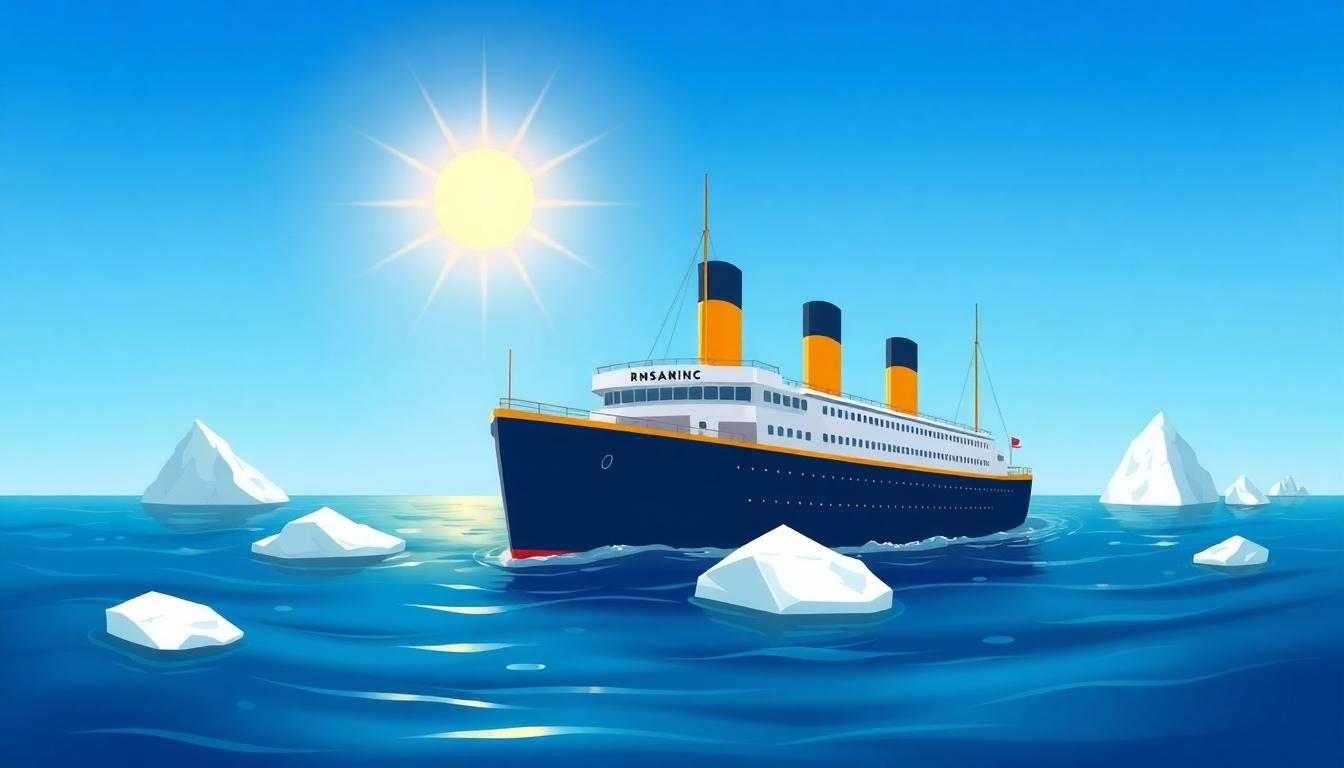
Read the Room First
Before launching into Titanic humor, we recommend gauging your audience’s sensitivity. Some individuals might find disaster jokes uncomfortable, especially if they have personal connections to maritime tragedies. Look for social cues that indicate openness to lighthearted banter about historical events. Timing matters significantly when delivering these jokes, as research shows that appropriate timing can make the difference between laughter and awkward silence.
Focus on Wordplay and Puns
Wordplay offers the safest route for Titanic humor without offending sensibilities. Effective Titanic jokes often rely on clever puns like “The Titanic was a real trendsetter; it always knew how to break the ice!” These ice-related puns create humor through language rather than making light of human tragedy. Nautical terms work wonderfully in this context too, such as jokes about “floating boats” or “making waves” that anthropomorphize the ship rather than its passengers.
Use Object Anthropomorphism
Addressing the ship itself rather than its passengers helps maintain respectful boundaries. Jokes that give the Titanic human qualities, such as “The Titanic had a great sense of humor; it always knew how to make waves” or “I asked the Titanic if it was sinking, but it just gave me the cold shoulder,” create distance from the human tragedy. This approach transforms potentially offensive material into lighthearted banter about an inanimate object.
Balance with Lighthearted Setups
Pairing darker punchlines with upbeat delivery helps maintain an appropriate tone. For instance, addressing an iceberg with “You crack me up!” creates humor through contrast rather than through the disaster itself. Simple one-liners like “Why did the Titanic bring a ladder? To reach new heights!” work well because they use absurdity rather than tragedy as their foundation. These setups prepare listeners for humor without making them uncomfortable.
Avoid Trivializing Loss of Life
The most important guideline involves steering clear of jokes that directly reference casualties or suffering. Research on Titanic humor indicates that successful jokes focus on the ship, the iceberg, or abstract concepts rather than human victims. Instead of referencing drowning or death, create situational humor around the event itself. This approach maintains respect for historical tragedy while still finding room for appropriate humor.
Incorporate Cultural References Carefully
When referencing historical or cultural elements, we recommend using fictional scenarios rather than actual events. Some effective Titanic jokes involve imaginary situations with historical figures, creating absurd scenarios that couldn’t have happened. These jokes work because they blend historical contexts with obvious fiction, signaling to listeners that the humor lies in the absurdity rather than in actual tragedy.
The Historical Context Behind Titanic Humor
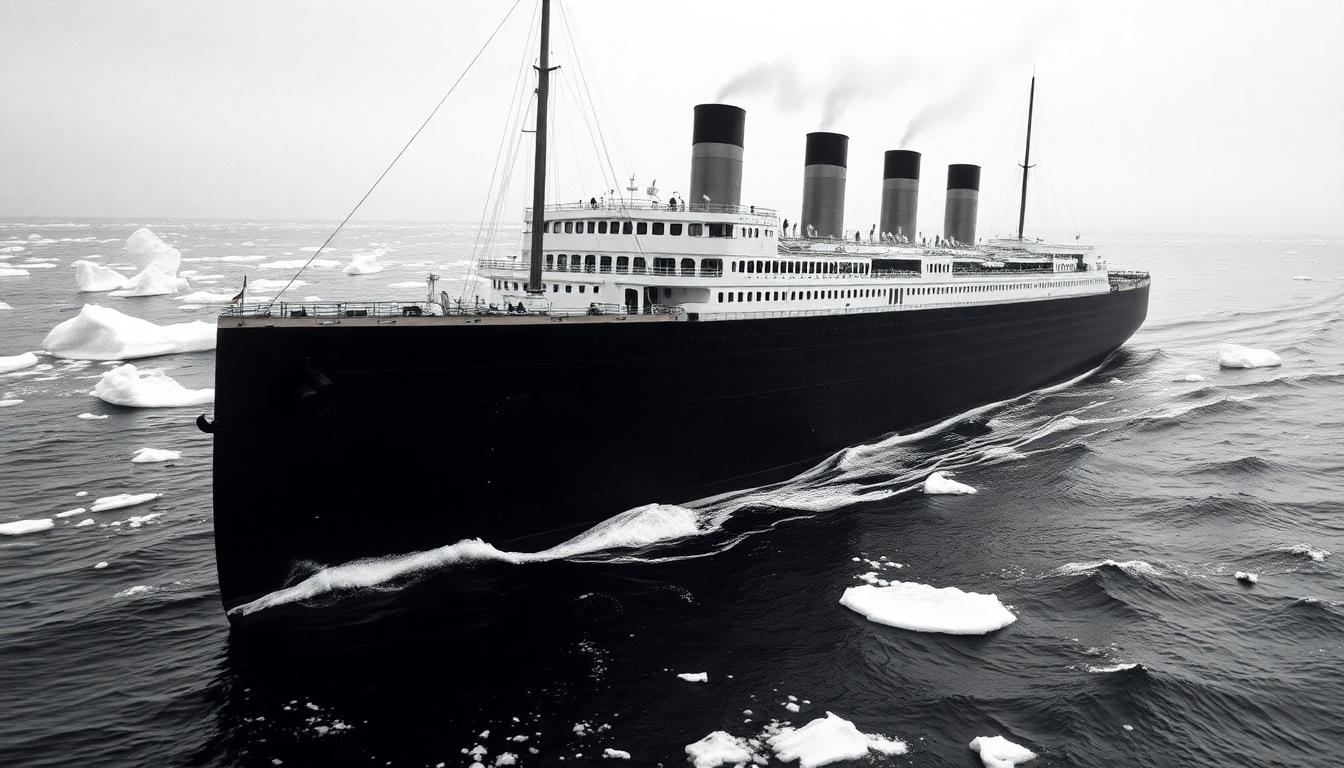
Introduction to Titanic Humor
The 1912 Titanic disaster represents one of history’s most profound maritime tragedies, yet it has somehow become a recurring subject in comedy. Humor surrounding the Titanic emerged surprisingly quickly after the catastrophe and has remained a fixture in popular culture for over a century. This unusual pairing of tragedy and comedy demonstrates humanity’s complex relationship with historical disasters and our tendency to process grief through humor.
Early Humor and Historical Context
Titanic jokes appeared almost immediately following the disaster, showing how quickly humor can emerge even from tragedy. A notable early example was published in Humoristické listy on June 14, 1912—just two months after the sinking—which satirized the supposed treasures being salvaged from the wreckage. These early comedic responses reveal that using dark events for humor isn’t merely a modern phenomenon but rather a longstanding human reaction to catastrophe.
Factors Contributing to Titanic Jokes
Several key elements explain why Titanic humor continues to resonate with audiences:
- Historical Distance: Over 110 years have passed since the disaster, creating emotional separation that makes comedy more acceptable. Most people today don’t have direct connections to victims, removing personal sensitivity.
- Universal Knowledge: The basic Titanic story serves as shared cultural knowledge, allowing jokes to function without extensive explanation. This widespread familiarity creates an immediate reference point for comedy.
- Comedic Contrast: Humor often thrives on unexpected juxtapositions, and few contrasts are more striking than finding levity in a notorious disaster. This tension between tragedy and comedy creates a powerful foundation for jokes.
- Film Influence: James Cameron’s 1997 blockbuster dramatically expanded the material available for Titanic humor. Iconic scenes like the “king of the industry” moment and the door controversy provide fresh angles for comedic interpretation.
Examples of Titanic Jokes
Titanic humor encompasses various comedic approaches, with wordplay and irony featuring prominently:
- “Why did the Titanic never get a job? Because it always sank during interviews.”
- “Why did the Titanic always bring a pencil? To draw the iceberg’s attention.”
These jokes demonstrate how wordplay transforms the disaster’s core elements—sinking, icebergs, and the ocean—into unexpected punchlines that create humor through surprise and clever linguistic connections.
Why We Laugh at Tragedy: The Psychology of Titanic Jokes

The Catharsis Effect
Laughter serves as a powerful emotional release when confronting tragic events like the Titanic disaster. This cathartic response allows us to process complex feelings about mortality and human vulnerability through humor rather than fear or sadness. Research shows that joking about tragedies provides a form of emotional relief by transforming overwhelming negative emotions into manageable experiences. Many people find that Titanic jokes create a safe psychological space to acknowledge the disaster while simultaneously distancing themselves from its full emotional impact.
The Incongruity Theory in Action
Titanic jokes work largely because of the stark contrast between tragedy and comedy. The unexpected juxtaposition of a serious historical disaster with lighthearted punchlines triggers what psychologists call the incongruity theory of humor. Our brains experience pleasure when resolving the cognitive dissonance between these contrasting elements. For example, jokes that play on the ship’s collision with an iceberg create humor through this unexpected pairing of catastrophe with wordplay or puns, allowing us to process tragedy through a different cognitive framework.
Coping Through Comedy
Dark humor about the Titanic functions as a sophisticated cognitive coping mechanism. By transforming the disaster into comedy, we gain psychological distance from traumatic historical events that might otherwise be difficult to process. People often use humor to make sense of senseless tragedies, with Titanic jokes offering a way to acknowledge human vulnerability while maintaining emotional equilibrium. This psychological distancing allows us to engage with difficult subject matter without becoming overwhelmed by its tragic dimensions.
Cultural Knowledge and Collective Experience
The widespread familiarity with the Titanic story creates the perfect conditions for shared humor. James Cameron’s 1997 blockbuster film significantly amplified public awareness, providing common reference points that make Titanic jokes instantly recognizable across various cultures. This shared cultural knowledge creates a sense of community through humor, allowing people to connect over common understanding of the historical event. The universality of the Titanic narrative makes it particularly fertile ground for comedy that resonates across different audiences.
Historical Distance and Sensitivity
The century-plus timespan since the 1912 disaster has created sufficient historical distance for many to find Titanic humor acceptable. Studies on disaster humor suggest that temporal distance plays a crucial role in determining when tragedy becomes suitable material for comedy. Interestingly, research reveals that Titanic jokes emerged even in the aftermath of the disaster itself, challenging the notion that disaster humor is solely a modern phenomenon. This historical context demonstrates that using humor to process tragedy represents a longstanding human response rather than a contemporary development.
Conclusion: The Unsinkable Legacy of Titanic Humor
Titanic jokes have truly proven themselves unsinkable in our cultural industry. They’ve evolved from whispered humor in 1912 to viral TikTok sensations today while maintaining their ability to help us process tragedy through laughter.
The enduring appeal of these jokes lies in their perfect balance of historical significance and comedic relief. Whether through clever wordplay or film parodies they’ve created a shared language around a pivotal historical event.
We’ve seen how this humor serves as both entertainment and emotional catharsis allowing us to confront difficult themes of mortality hubris and human vulnerability. As we navigate the waters between respect and comedy Titanic jokes remind us that laughter often keeps our collective memory afloat even a century later.
Frequently Asked Questions
Is it inappropriate to joke about the Titanic disaster?
Humor about the Titanic is generally considered acceptable due to the historical distance (over 100 years). However, context matters. Jokes that focus on wordplay and absurd scenarios rather than human suffering are more appropriate. Always consider your audience’s sensitivities and preferences when sharing such humor.
When did Titanic jokes first appear?
Titanic jokes emerged shortly after the 1912 disaster itself, not just in recent times. Early examples were documented by humorists like Jaroslav Hašek. This challenges the notion that disaster humor is a modern phenomenon and shows how comedy has long served as a coping mechanism for tragedy.
Why do people find Titanic jokes funny?
People find Titanic jokes funny due to psychological mechanisms like the catharsis effect (emotional release) and incongruity theory (unexpected contrast between tragedy and comedy). These jokes allow us to process complex feelings about mortality and vulnerability while creating emotional distance from the tragedy.
How has social media affected Titanic humor?
Social media platforms, especially Instagram and TikTok, have revitalized Titanic humor for new generations. The disaster has become fodder for viral content, with creators developing clever one-liners, absurd survival scenarios, and short-form videos that transform historical tragedy into shareable, relatable comedy for modern audiences.
What impact did James Cameron’s film have on Titanic jokes?
Cameron’s 1997 blockbuster significantly expanded the repertoire of Titanic humor. The film introduced new joke material focusing on Jack and Rose’s romance, the “door debate” (whether Jack could have fit), and Celine Dion’s theme song. These elements have inspired countless parodies and memes that continue to resonate decades later.
How can I tell a Titanic joke without being offensive?
Focus on wordplay and puns rather than human suffering. Use techniques like object anthropomorphism (giving the ship human qualities) and lighthearted setups. Avoid direct references to loss of life or survivors’ trauma. Always gauge your audience’s comfort level before sharing such jokes.
Do Titanic jokes help people process tragedy?
Yes, psychological research suggests that humor serves as an effective coping mechanism for processing tragic events. Laughter provides emotional release and creates psychological distance from disturbing subjects. Titanic jokes allow people to collectively acknowledge human vulnerability and mortality while maintaining emotional resilience.
Are there cultural differences in how Titanic humor is received?
While the Titanic disaster resonates globally, cultural reception of such humor varies. Western societies generally find Titanic jokes more acceptable due to greater familiarity with the event. The widespread success of Cameron’s film created a shared cultural understanding that makes these jokes more accessible across different communities.

